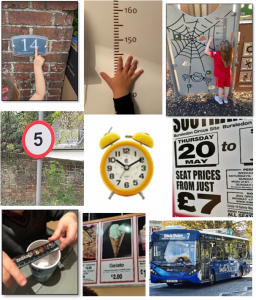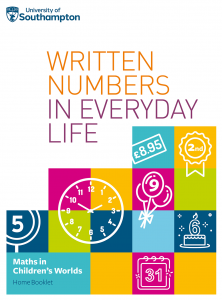
Resources

A longitudinal study to explore pre-school children’s understanding of the cultural rules and meanings of written numerals in their everyday environments.
Categories of Description (download pdf)
Four Critical Aspects of Variation in children’s awareness (download pdf)
The Outcome Space (download pdf)
Numbers in Everyday Life! Fostering children’s curiosity about Numbers in the world around them (NiEL)
We have designed a sequence of fun, everyday activities that aim at:
• engaging families of preschool children with conversations about the multiple meanings and purposes of written numbers in everyday life and
• fostering children’s curiosity and knowledge about written numbers outside the classroom.
The activities are informed by evidence collected by the University of Southampton team as part of a research project titled ‘Cultural rules and uses of written numerals in children’s everyday environments’, funded by The Leverhulme Trust in the UK (RPG-2019-330)

The principles of Variation Theory* underpin the design of these activities, which are sequenced to maximise the potential for learning.
By using principles of Variation Theory in a sequence of activities, we can support children’s learning by changing:
• what stays invariant
and
• what varies
The activities come in two different formats:
Home Learning Booklet (view preview)
The activities included in this booklet can be completed as part of the family’s everyday life and routines at home, or when out and about. It also includes activities that can be completed in the booklet itself.
Reference Guide For Teachers – Booklet (view preview)
An explanation of the rationale for the design of the booklet and ideas for how the booklet may be used are included in a brief reference guide for teachers.
Activity postcards (view preview 1) (view preview 2)
The set of activity postcards can be used in a flexible way. Teachers can remove one card from the set at a time and share with children as a Weekend challenge.
Reference Guide For Teachers – Activity postcards (view preview)
An explanation of the rationale for the design of the activity postcards and ideas for how these may be used are included in a brief reference guide for teachers.
* Orgill, M. (2012). Variation Theory. In: Seel, N.M. (Ed) Encyclopaedia of the Sciences of Learning. Springer, Boston, MA. doi.org/10.1007/978-1-4419-1428-6_272

ESRC Festival of Social Sciences Event – Numbers in Everyday Life!
Event presentation (download pdf)
Festival of Social Sciences event page (visit site)
Number Spotting Game
The Number Spotting Game in action video montage

